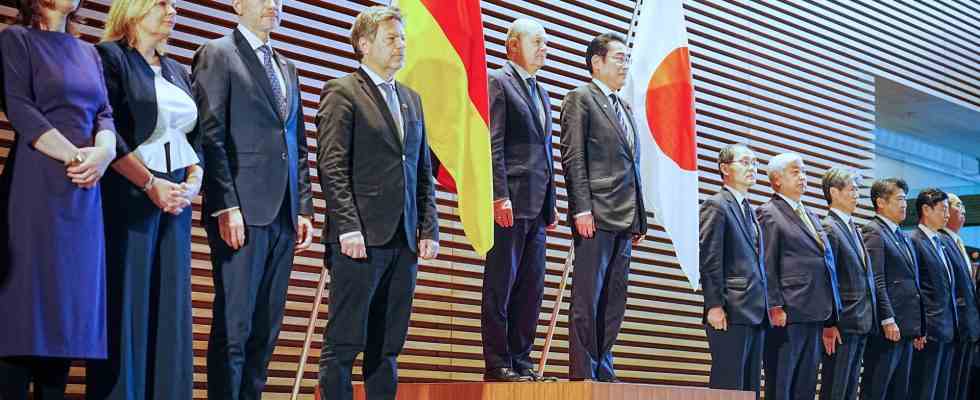Status: 03/18/2023 11:47 a.m
After the Japanese-German government consultations, Chancellor Scholz and Prime Minister Kishida emphasize the close relationship between the two countries. Topics of conversation were economy, defense and the protection of critical infrastructure.
During his visit to the Japanese capital, Tokyo, Chancellor Olaf Scholz described relations with Japan as close. “We are united by democratic principles,” said the SPD politician after the government consultations with Japan’s Prime Minister Fumio Kishida, six ministers of the traffic light government and their Japanese counterparts.
Kishida also acknowledged relations with Germany as closer than ever. “Japanese-German relations are stronger and closer than ever,” he said after the first meeting with Scholz before the bilateral government consultations.
Six ministers present
“It’s nice to be back in Tokyo,” said Scholz. His inaugural visit was just eleven months ago. Since then, the federal government has spoken to Japanese representatives on the sidelines of a large number of international meetings.
The Chancellor will be accompanied in Tokyo by six ministers: Economics Minister Robert Habeck, Foreign Minister Annalena Baerbock, Finance Minister Christian Lindner, Interior Minister Nancy Faeser, Defense Minister Boris Pistorius and Transport Minister Volker Wissing.
Ulrich Mendgen, ARD Tokyo, explains the possible cooperation between Germany and Japan and the advantages of it
tagesschau24 09:00 a.m., 18.3.2023
Accompanied by high-ranking business delegation
Scholz emphasized that the good relations between Japan and Germany had been raised to a new level with the first German-Japanese intergovernmental consultation. According to Scholz, the fact that the cabinet members from Germany were accompanied by a high-ranking business delegation shows that German business is also very interested in good cooperation.
The talks are a reaction to the economic dependency on Russia, said Scholz. The aim is to increase the resilience of the two economies. Japan, which also imports large quantities of raw materials, has enacted its own law on economic security, which the federal government regards as exemplary. A separate ministerial post was also created for the priority topic.
Protection of critical infrastructure
In the event of financial uncertainties caused by problems between Western banks, Japan and Germany want to coordinate closely in the future. The Federal Minister of Finance Lindner and his Japanese counterpart Shunichi Suzuki agreed this at a 45-minute meeting. At the same time, they want to carefully monitor global markets and the economy, an official with Japan’s finance ministry told Reuters.
In addition to economic security, the talks also dealt with the protection of critical infrastructure, said Scholz. They want to learn from each other how to better protect sensitive areas – for example in cyber security. The aim is a free, open and secure network. Global supply chains and the freedom of the seas were also topics.
New visit to Japan for the G7 summit in May
The talks also focused on security in the Indo-Pacific. The Bundeswehr will go there again next year, said Scholz. The Bundeswehr has already sent a warship and fighter jets to the Pacific region to strengthen cooperation with friendly armed forces there.
There are several territorial conflicts in the South China Sea between China and countries such as Vietnam, the Philippines and Malaysia. Added to this is the conflict between China and Taiwan, which sees itself as independent, which the government in Beijing does not accept.
Scholz said at the end that he would be back in Japan in two months. The country currently chairs the G7. The annual summit takes place in Hiroshima in May.
Chancellor and his ministers for the first government consultations in Japan
Kathrin Erdmann, ARD Tokyo, March 18, 2023 6:34 a.m

